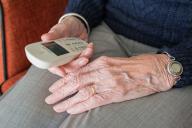brain damage
Post-concussion syndrome: What is it
Post-concussion syndrome is a complication of traumatic brain injury. It is a common consequence of concussion and is less commonly diagnosed in other TBIs.
Diana Dashkevich brain mental health health health facts Psychology 9 February 2024Important to Know: What is Epilepsy
Epilepsy is a pathology of the nervous system, which causes periodic attacks with impaired motor and mental functions.
Diana Dashkevich brain health health facts Psychology 7 February 2024A new discovery: Snail protein – brain injury healing can be easier
Scientists discovered more about how the human brain responds to injuries. They found a vital protein called Snail that helps coordinate the response of brain cells after an injury to the central nervous system.
Kate Yakimchuk research protein health facts science Psychology 22 January 2024A new discovery: It might be dangerous – soccer heading leads to brain function issues
Sportsmen often have traumas that can affect their health, and not all of these traumas are easy to see right from the start. A recent study indicates a connection between soccer heading, where footballers hit the ball with their head, and a quite noticeable decline in the microstructure and function of the brain over two years.
Kate Yakimchuk research brain activity cognition intelligence Psychology 19 January 2024A new discovery: Detecting brain injury through the eye – it's safe!
Scientists made a device to check for brain injuries by shining a safe laser in the eye. It works differently from other methods and could be a handheld device used right after an injury when quick decisions about treatment are crucial.
Kate Yakimchuk research treatment health Psychology 12 January 2024A new discovery: Roots of heavy drinking – peptide influence
Drinking alcohol for a long time can change the brain and cause stress-related effects that make people keep drinking. A team of specialists have found new aspects that affect that bad habit and its influence.
Kate Yakimchuk research alcohol Psychology 11 January 2024Expert Explanation: What is Aphasia
Aphasia is the loss of speech functions that occurs due to damage to the speech center in the cerebral cortex. As a result, a person loses the ability to speak and/or listen to conversations, and in some cases, count, read or write.
Diana Dashkevich health mental health brain facts Psychology 29 December 2023An amazing brain-healing protein: A new study
A recent study helps us understand how the brain reacts to injuries. Scientists found that a protein called Snail is crucial in organizing how brain cells respond after an injury.
Kate Yakimchuk research human brain protein science Psychology 13 December 2023Brain can't rewire itself: A new study on brain damage and recovery
Contrary to pretty popular belief, specialists think that the previously injured brain cannot completely rewire itself in response to brain injury. The concept that it can repurpose regions for new functions, such as using the visual cortex for echolocation in people who can't see, is considered flawed.
Kate Yakimchuk research science Psychology 5 December 2023Loss of hearing is tied to brain changes: A new study
Hearing loss is common among seniors in the US and has been linked to a higher risk of dementia, although the exact reasons are not completely clear. To investigate this link further, scientists conducted hearing tests and brain scans using MRI to see if hearing problems are associated with differences in specific brain regions.
Kate Yakimchuk research alzheimer science Psychology 4 December 2023When sports actually damages your brain: A new study on soccer headers
We all know the stereotype that sportsmen are strong but silly, but it seems that some types of sport can actually cause cognitive decline. A new test shows that lots of soccer players tend to have decreased cognitive abilities later in life.
Kate Yakimchuk research cognitive decline sports Psychology 1 December 2023Healing after trauma: A new study on nervous system
Peripheral neuropathy affects over 3 million people in the US annually, causing pain and loss of feeling. Scientists have discovered a mechanism that can effectively heal damaged nerves in lab mice.
Kate Yakimchuk research nervous system neurons Psychology 30 November 2023Where the knowledge is hidden: More information on how our brain collects and stores knowledge
Have you ever wondered in which part of your brain all your knowledge lies? A groundbreaking study by neuroscientists at Georgetown University Medical Center has challenged a century-old understanding of the brain's auditory lexicon, the catalog of verbal language.
Kate Yakimchuk research learning foreign languages brain Psychology 22 July 2023Heavy drinkers have higher brain inflammation risks: Lear more about human brain
We all know that heavy drinkers damage their brains, but new research shows that consequences can be even more damaging than we thought. Alcohol use disorder (AUD) involves a destructive cycle between brain changes and unusual behaviors.
Kate Yakimchuk drinks alcohol brain research Psychology 14 July 2023Too much alcohol can damage your brain cells forever: The new study shows terrifying results
A study published on Science Direct claims that long-term alcohol drinking can irreversibly damage your brain. While some negative effects can go away after you stop drinking for a while, others may stay with you forever.
Kate Yakimchuk brain health mental health alcohol Psychology 16 June 2023













